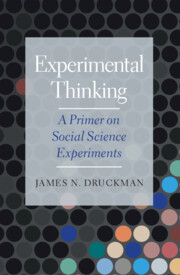Book contents
- Experimental Thinking
- Experimental Thinking
- Copyright page
- Dedication
- Contents
- Figures
- Tables
- Preface
- Acknowledgments
- 1 Why a Primer on Social Science Experiments?
- 2 The Scientific Process and How to Think about Experiments
- 3 Evaluating Experiments
- 4 Innovations in Experimental Designs
- 5 What to Do before, during, and after an Experiment
- 6 Designing “Good” Experiments
- References
- Index
2 - The Scientific Process and How to Think about Experiments
Published online by Cambridge University Press: 12 May 2022
- Experimental Thinking
- Experimental Thinking
- Copyright page
- Dedication
- Contents
- Figures
- Tables
- Preface
- Acknowledgments
- 1 Why a Primer on Social Science Experiments?
- 2 The Scientific Process and How to Think about Experiments
- 3 Evaluating Experiments
- 4 Innovations in Experimental Designs
- 5 What to Do before, during, and after an Experiment
- 6 Designing “Good” Experiments
- References
- Index
Summary
Chapter 2 starts by placing experiments in the scientific process – experiments are only useful in the context of well-motivated questions, thoughtful theories, and falsifiable hypotheses. The author then turns to sampling and measurement since careful attention to these topics, despite being often neglected by experimentalists, are imperative. The remainder of Chapter 2 offers a detailed discussion of causal inference that is used to motivate an inclusive definition of “experiments.” The author views this as more than a pedantic exercise, as careful consideration of approaches to causal inference reveals the often implicit assumptions that underlie all experiments. The chapter concludes by touching on the different goals experiments may have and the basics of analysis. The chapter serves as a reminder of the underlying logic of experimentation and the type of mindset one should have when designing experiments. A central point concerns the importance of counterfactual thinking, which pushes experimentalists to think carefully about the precise comparisons needed to test a causal claim.
Keywords
- Type
- Chapter
- Information
- Experimental ThinkingA Primer on Social Science Experiments, pp. 15 - 50Publisher: Cambridge University PressPrint publication year: 2022

